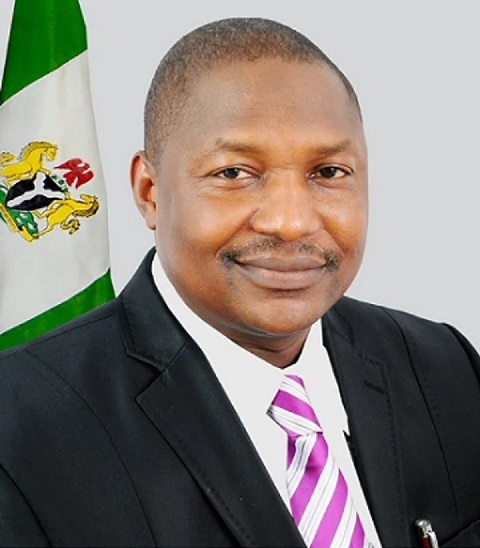DEFENCE
NSCDC, EFCC Partner on Forensic Investigation

The Nigeria Security and Civil Defence Corps (NSCDC) has partnered the Economic and Financial Crimes Commission (EFCC) on the deployment of forensic investigation to track criminals.
The partnership was established when NSCDC Forensic Unit officers paid a visit to EFCC Headquaters Forensic Laboratory on Tuesday in Abuja.
Mr Tersoo Shaapera, Head of NSCDC Forensic and Psychological Services, said that the visit to the EFCC was imperative being an advanced agency in crimes forensic study and analysis.
Shaapera said that the partnership was to foster capacity building of personnel, and training on criminal cases management, among other areas of speciality.
He described the EFCC’s Forensic Laboratory as one of the best in Africa, adding that “ we know your system is bigger than ours and we know we can profit from the commission.”
“ The Corps is not yet there but we are not where we used to be.
“We are here to create a physical bond so that when there are issues it could be presented to EFCC as we are all government agencies”, he said.
Shaapera said that there was need to collaborate to understand why criminals continuously committed crimes which at times were same in nature.
“It will help us to reduce crime and also know if it is psychologically related,” he said.
Shaapera said that the corps’ Commandant General, Mr Ahmed Audi, saw the need for the establishment of the unit to meet the obligation of crime prevention and response.
“The unit was created to protect the nation’s critical national assets and infrastructure from criminals alongside other reasons,” he said.
The Unit Head, further said that the unit had been able to conduct psychological profiling, investigate motives behind crimes and adopted confidentiality of documents.
Responding, EFCC Forensic Department Director, Mr Benedict Agweye, said that the collaboration will help in curbing crimes.
The Director represented by EFCC Forensics Head, Mr Gideon Dashong, described forensic analysis as broad, stating that the commission was involved in a large number of aspects.
“We too can benefit in some aspects that we don’t have, but whatever areas you will need our specialty, the Corps should write to the commission for approval,” he said.
Dashong advised the Corps to have pictorial and graphical information of all suspects arrested to enhance operations in the unit.
He said that this would also help in information sharing amongst security agencies which will help in the fight against insecurity and criminality.
He also said that forensics was time consuming and an analyst needed to be analytical to avoid incriminating innocent suspects.
During the visit, the NSCDC delegates visited the EFCC finger print processing room, quality control and assurance room, digital lab, forensic document examination, finger print and crime scene, among others.
The Forensic Head said that the data gotten from the processing of finger prints help to identify suspects and criminals with multiple identities.
He said that to avoid documents gotten during investigation not to be thrown out of court rooms, it was important to limit compromise and ensure confidentiality.
He said that the Commission adopted the use of chain of custody, evidence collection and evidence submission forms to achieve quality standard of operations.
He also said that knowing how to effectively collect data from phones and computer was important as it served as major exhibit.
Dashong said that when investigating cyber criminals, the commission’s experiences enabled it to match up to the criminals’ tactics.
“ We noticed they are able to work together and trust themselves a lot and have a good cooperation.
“ They work in syndicate than alone and most times they have hidden crimes but we have softwares that we use to keep up.
“Phones password is a bit of a problem but we have tools now to crack these passwords,” he added.(NAN)
DEFENCE
Maj Gen Waidi Shaibu Assumes Command as 25th Chief of Army Staff

By David Torough, Abuja
The Nigerian Army on Thursday marked a seamless change of leadership as Maj. Gen. Waidi Shaibu officially assumed office as the 25th Chief of Army Staff (COAS).
The handing and taking over ceremony was held at the Army Headquarters, Abuja, between the outgoing COAS, now Chief of Defence Staff (CDS), Lieutenant General Olufemi Oluyede, and his successor.
In his maiden address, Maj.
Gen. Shaibu commended Lieutenant General Oluyede for his exemplary leadership, mentorship, and unwavering commitment to the progress of the Nigerian Army. He praised his predecessor’s accomplishments in equipment procurement, infrastructural development, and the “Soldier First” initiative, which placed troop welfare and operational readiness at the core of Army operations.The new COAS pledged to sustain and build upon the legacies of his predecessor while enhancing collaboration among security agencies to strengthen national security. He assured that the current security landscape would be critically assessed, with prompt responses to emerging threats.
“I salute the courage, passion, resilience, and discipline of our troops in the field. Their sacrifices remain the cornerstone of our collective success,” he stated.
Shaibu expressed deep appreciation to the Commander-in-Chief of the Armed Forces, President Bola Ahmed Tinubu, GCFR, for entrusting him with the leadership of the Nigerian Army. He also led senior officers in observing a minute’s silence in honour of fallen heroes.
In his valedictory remarks, the outgoing COAS and new CDS, Lieutenant General Olufemi Oluyede, appreciated President Bola Tinubu for his visionary leadership and the opportunity to serve. He lauded officers and soldiers of the Nigerian Army for their dedication and urged them to remain loyal and committed under the new leadership.
“The mission remains the same — to ensure the security of lives and defend the territorial integrity of our nation,” he said.
Earlier, the former Chief of Policy and Plans (Army), Maj. Gen. Abdulsalami Ibrahim, described General Oluyede as a selfless and visionary leader whose impact would be remembered by generations of officers.
The event featured the signing of handover documents, decoration of the new Army Chief with Headquarters insignia, inspection of the quarter guard, and group photographs with senior officers and field commanders.
DEFENCE
Armed Forces Sustain Nationwide Onslaught, Record Major Gains Against Terrorists, Criminals

By David Torough, Abuja
The Armed Forces of Nigeria have sustained an aggressive nationwide campaign against terrorists, bandits, and other criminal groups, recording major operational successes across all theatres within the week ending October 16, 2025.
Director of Defence Media Operations, Major General Markus Kangye, who disclosed this during the weekly press briefing in Abuja, said the operations reflected the continued dedication, professionalism, and discipline of Nigerian troops on land, in the air, and at sea.
According to him, coordinated operations under various Joint Task Forces—Operation HADIN KAI in the North East, Operation FANSAN YAMMA in the North West, Operations ENDURING PEACE and WHIRL STROKE in the North Central, Operation DELTA SAFE in the South-South, and Operation UDO KA in the South-East—resulted in the neutralisation of several terrorists, arrest of criminal elements, and rescue of kidnapped victims.
In the North East, troops denied Boko Haram, ISWAP, and JAS fighters freedom of movement through aggressive ground and air operations in parts of Borno, Yobe, and Adamawa States. Scores of terrorists were eliminated, 16 collaborators arrested, and seven hostages rescued. Troops also recovered assorted weapons, vehicles, and ₦5.14 million in cash.
Similarly, in the North West, troops sustained their offensive against bandits in Sokoto, Zamfara, Kebbi, Kaduna, and Niger States. Several terrorists were killed, 14 arrested, and six kidnapped victims rescued. A gunrunner and two drug cartel members were also apprehended with 1,307 live ammunition, motorcycles, narcotics, and ₦227,000.
In the North Central region, under Operations ENDURING PEACE and WHIRL STROKE, troops carried out raids and responded to distress calls in Plateau, Kaduna, Taraba, Benue, Nasarawa, and Kogi States, neutralising criminals and rescuing 17 kidnap victims. Four suspects were also convicted and sentenced by a magistrate court in Plateau State.
In the South-South, Operation DELTA SAFE troops foiled oil theft valued at over ₦98.7 million, destroying 11 illegal refining sites and arresting 13 suspects. The troops also seized large volumes of stolen petroleum products and dismantled multiple illegal refining facilities across Delta and Rivers States.
Meanwhile, in the South-East, troops of Operation UDO KA arrested a notorious IPOB/ESN commander known as Gentle alongside eight accomplices in Imo and Ebonyi States. A female logistics supplier linked to the group was also apprehended in Abia State, where three children of a wanted terrorist leader were found in her custody.
Major General Kangye commended the gallant troops for their bravery and sacrifices, assuring Nigerians that the Armed Forces remain steadfast and resolute in securing the nation.
“Our recent operational successes—whether in counterterrorism, anti-banditry, maritime security, or internal operations—are not just battlefield victories but clear demonstrations of our resolve to secure every inch of Nigeria,” he stated.
He urged citizens to continue supporting the military through credible intelligence sharing, noting that collective cooperation remains vital to achieving lasting peace and stability across the country.
CRIME
Police Arrest 53 Suspects over Benue, Plateau Killings – IGP

By David Torough, Abuja
Barely one weekend after President Bola Tinubu’s directives to immediately fish out the perpetrators of the Yelewata massacre in Benue state, the Inspector-general of Police (IGP) Kayode Egbetokun has confirmed the arrest of 26 suspects for their alleged involvement in the recent massacre at Yelewata community of Guma local government area in Benue State.
Egbetokun said in the attack, 47 villagers were killed, two attackers were killed by the police and over 100 others were displaced.
He disclosed this during a press briefing at the Force Headquarters yesterday in Abuja.
Egbetokun said the majority of the suspects were arrested on June 22.
Relatedly, the IGP also revealed that 22 suspects have been arrested for killing 12 travellers in Plateau State, while five persons have been arrested for killing two people in Benue State this week.
The arrests were coming barely a week after President Bola Tinubu directed the immediate arrest of the killer-herders who perpetrated the heinous killing of over 100 people in Yelewata community in Benue State.
Tinubu gave the directive while addressing stakeholders at the Government House, Markudi, during a visit to the State.
The meeting included the Secretary to the Federal Government, George Akume, Traditional Rulers and former governors of the state among others.
Tinubu had called out the Inspector General of Police to know why arrests had not been made at the time.
“How come no one has been arrested for committing this heinous crime in Yelewata. Inspector General of Police, where are the arrests? The criminals must be arrested immediately,” President Tinubu directed.
He urged the heads of the Department of State Services (DSS) and the National Intelligence Agency (NIA) to intensify surveillance and gather actionable intelligence to apprehend the perpetrators.
| ReplyReply allForwardAdd reaction |






























